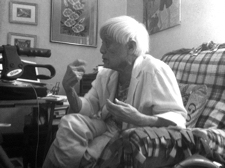Who is Grace?
April 1, 2021Perhaps the very simplicity of grace is what makes it hard to describe. I’ve been in more than one meandering conversation with Unitarian Universalists about what is grace anyway. Rather than focus on the what today, I want to tell you about the who: Grace Lee Boggs.
Grace was a Chinese-American activist who lived in Detroit and worked for seventy years, connected in community for Black liberation. She was a teacher and writer who believed that freedom was possible and that people could learn how to achieve it, especially by working together to make change. In one conversation with journalist Amy Goodman, Grace Lee Boggs said:
“One of the difficulties when you’re coming out of oppression is that you get a concept of a messiah. You have to get to the point that we are the leaders we have been looking for. We are the children of Martin and Malcolm. I don’t know what the next American Revolution is going to be like, but you might be able to imagine it if your imagination were rich enough.”
Grace Lee Boggs offered the wisdom of change; as Unitarian Universalists, we find ourselves swimming in the deep end of the ocean of change. Most congregations have not been meeting in their buildings for going on more than a year now. We find the political climate and even the meteorological climate to be in the process of change. This would not have been a surprise to Grace Lee Boggs. She viewed change as a container for possibility. She also gave this encouragement:
“Keep realizing that reality is changing and that your ideas have to change. Don’t get stuck in old ideas.”
What does that mean for Unitarian Universalists in this particular moment? First, it is true that no one is coming to save us. If one of the definitions of grace is refined movement, we come to the legacy of Grace Lee Boggs as a framework that can allow refinement of our movement, or the embodiment of grace. As a movement, we will continue to change. As the risk level of COVID-19 transmission decreases, we will move into multi-platform modes of worship, or online and in-person combinations of worship that continue to keep our communities safe and move toward a goal of in-person worship. We will encounter the changing political climate with courage and the stamina that it will take to change both feelings and ideas, toward equity, toward Beloved Community.
One of the ideas that we have the opportunity to embrace as refinement of our movement is the Eighth Principle.
“We, the member congregations of the Unitarian Universalist Association, covenant to affirm and promote: journeying toward spiritual wholeness by working to build a diverse multicultural Beloved Community by our actions that accountability dismantle racism and other oppressions in ourselves and our institutions.”
It is both a new idea and a new practice to say this out loud and to plan to live into it. And we, who have now endured a season of change in which we had few choices, can use our adaptability to continue looking for the ideas that will allow us to live into who we say we are, Seven Principles, then Eight, by which we love each other, our communities, and the world, into healing, into wholeness, and into a new horizon of joy. Come. We are the ones who must lead us forward.
- Who is Grace? - April 1, 2021
- Biscuits and Star Stuff - February 1, 2017
- Midori and the E Strings - March 1, 2016
Quest Monthly Print Edition
Recent Issues
Latest Spiritual Reflection Posts
Weekly Newsletter
About
Quest for Meaning is a program of the Church of the Larger Fellowship (CLF).
As a Unitarian Universalist congregation with no geographical boundary, the CLF creates global spiritual community, rooted in profound love, which cultivates wonder, imagination, and the courage to act.
Contact
Church of the Larger Fellowship Unitarian Universalist (CLFUU)
24 Farnsworth Street
Boston MA 02210

